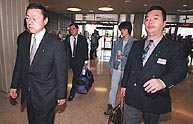 Pressure to raise vessel mounts Pressure to raise vessel mounts
 Civilians plan to contact relatives Civilians plan to contact relatives
 Video of the sunken Ehime Maru Video of the sunken Ehime Maru
 A Tribute to the Missing A Tribute to the Missing
 Previous stories Previous stories
 What do you think of the collision of the USS Greeneville and the Ehime Maru? Join our discussion board. What do you think of the collision of the USS Greeneville and the Ehime Maru? Join our discussion board.
By Walter Wright
Advertiser Staff Writer
The court of inquiry that begins here Thursday on the sinking of the Ehime Maru will have a profound effect on Japanese attitudes toward the United States, leaders of Japan’s largest opposition party said yesterday.
 |
| Japanese foreign affairs official Yoshitaka Sakurada, left, and an unidentified official on Sunday escort family members of victims of the Ehime Maru through Honolulu International Airport upon their departure.
Deborah Booker • The Honolulu Advertiser |
The convening of the inquiry "is a very good first step," said Eisei Ito, a foreign affairs leader of the Democratic Party of Japan visiting Hawai‘i.
"But what is important is how exactly it proceeds from now on" in determining responsibility, changing procedures to prevent another accident, and providing compensation for the families of the missing, said Ito.
A failure to handle the investigation properly will lend strength to requests to reduce the U.S. troop presence in Okinawa, and to make GIs subject to Japanese courts in criminal cases there, he said.
"The bottom line is that this accident is perceived by Japanese as just Japanese fishery high school students passing by and a U.S. Navy submarine hit them and sank them and probably killed them," he said.
"It’s obviously a mistake made by human error, not a natural disaster, and that’s why they (the Japanese people) are very, very angry about how slow (the Navy has been) in taking actions and about explaining and coming forth with clear information and all the information known to them."
After spending three days in Hawai‘i, members of the group left for Washington, D.C., last night to convey their concerns to the Department of Defense and the Bush administration.
Representative Nobuhiko Suto said the court of inquiry indicates "that the United States is taking this case seriously."
Keiichiro Asao, a member of the Japan Parliament’s upper house, said that the court of inquiry is open to the public helps.
"That probably would help the Japanese and also the American public understand the process and what’s going on," Asao said.
Courts of inquiry usually are only held to examine the most serious incidents — the sinking of the USS Maine in Havana harbor in 1898, the actions of top officers before the surprise Japanese attack on Pearl Harbor in 1941, and the North Korean seizure of the USS Pueblo in 1968.
The last such major Navy inquiry followed a 1992 accident in which the USS Saratoga mistakenly fired two missiles into a nearby Turkish destroyer during an exercise in the Mediterranean Sea.
Adm. Thomas Fargo, Pacific Fleet commander, said Saturday that he decided on the court of inquiry in part because it offered "a forum for public disclosure." Unlike less formal proceedings, it will have subpoena power and will take sworn statements that can be scrutinized by outsiders.
The Greeneville was conducting an emergency surfacing drill Feb. 9 when it rammed the Japanese ship, which sank within minutes. Of the 35 people aboard, nine are missing and presumed dead.
 |
| Eisei Ito said an inquiry is a "good first step." |
The court of inquiry could order courts-martial on criminal charges for the sub’s skipper, Cmdr. Scott Waddle, and members of his crew. The court could pursue lesser administrative punishments, or find no reason for further action.
The inquiry is expected to proceed swiftly, with probably no more than about 20 witnesses called, a Pentagon official told the Washington Post yesterday.
It probably first will hear testimony from Rear Adm. Charles Griffiths about the conclusions of the initial Navy investigation he conducted. Then it is expected to call Waddle; his executive officer, Lt. Cmdr. Gerald K. Pfeifer; and the young officer who was "officer of the deck" at the time of the incident, Lt. j.g. Michael J. Coen.
"The key question will be: Why didn’t you know the boat was there?" the Pentagon official said. The inquiry is likely to focus on the periscope surveys of the surface conducted before the Greeneville submerged to execute its rapid ascent drill, called an "emergency main ballast blow."
The court of inquiry is expected to look into why the sub’s sonar operators failed to detect the presence of the Japanese ship. In addition, the court might ask whether the "climate of command" created by Waddle made sailors feel they could speak up if they believed they had information that might contradict him.
The entire process will be followed closely by the Japanese, the Democratic Party leaders from Japan said here yesterday.
Japanese will press for reduction in U.S. bases throughout their country if the United States does not complete a full, fair and open investigation, the party leaders said.
"The U. S.-Japan relationship really will be depending on how the U.S. handles the situation, and we have great concerns, so we have requested that the U. S. government be very careful and cautious and conduct a thorough investigation," said Ito.
He said Japanese so far have more confidence in an investigation being run by the U.S. National Transportation Safety Board than by the U. S. Navy.
Suto said that since the Greeneville was conducting an emergency surfacing drill with civilian guests aboard, every precaution should have been taken to assure that there was no ship in the submarine’s path.
Suto said of the emergency ascent drill, "If it is a demonstration, and everything has to be cleared before beginning their emergency blast blow, the emergency ascent, then there is a criminal element involved if the commander made a wrong decision in doing the ascent without detecting the surface of the sea and approaching ships.
"I hope the general public and the National Transportation Safety Board will do the best . . . to hinder future accidents like this."
Ito said families of the missing have asked that Waddle apologize to them personally for the loss of their loved ones.
Japan’s culture places a premium on those responsible accepting their responsibility, and on showing respect for the loss of life.
Ito said the families of the missing expressed appreciation to Hawaii citizens, including members of Japanese organizations here, for their expressions of condolence and contributions to an Ehime Maru fund.
Washington Post contributed to this report.
[back to top] |


